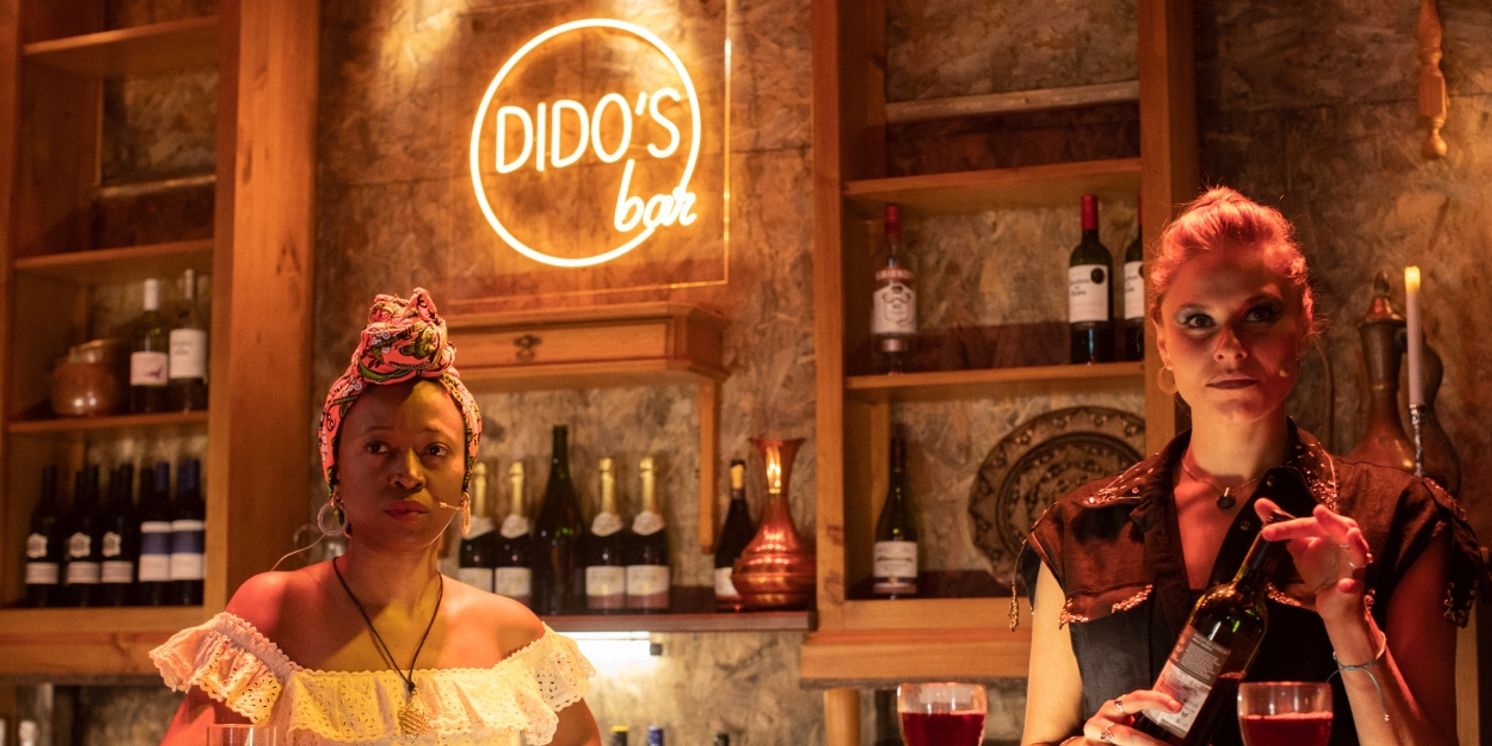Review: DIDO'S BAR, The Factory
Virgil's Aeneid gets a modern update.

![]() What began with an encounter between director Josephine Barton and Kurdish Iranian musician Marouf Majidi in 2017 in Helsinki has culminated in a converted factory space in Newham and Dido's Bar, a story of immigrants fleeing war and persecution and finding love in foreign lands.
What began with an encounter between director Josephine Barton and Kurdish Iranian musician Marouf Majidi in 2017 in Helsinki has culminated in a converted factory space in Newham and Dido's Bar, a story of immigrants fleeing war and persecution and finding love in foreign lands.
As the title suggests, Barton found inspiration for the plot from Virgil's Aeneid, well known for being the Roman poet's masterpiece. Over twelve books and 9,896 lines (all in dactylic hexameter), it tells how the war between Greece and Troy forces Aeneas to leave his home for a new life in Carthage. There, he falls for the queen Dido and plays out a tragic love affair before moving on to Italy. Less well known is exactly how many people have read all twelve books.
Dido's Bar (which sets off next month for a national tour) has much to recommend it. The four-strong live band led by Ben Sutcliffe features the talented Majidi on a variety of Iranian instruments including a tar and a tanbur. Whether backing the actor-musicians as they sing or just strumming along, they provide the heart of this slice of gig theatre.
Writer Hattie Taylor has slanted Virgil's story somewhat, moving it to the modern day. Here, Dido (Lola May) is a bar manager who takes pity on the refugee Aeneas (Lahcen Razzougui). She helps get him with the necessary paperwork and attain the right to remain; in turn, he turns her mind away from her murdered husband towards the possibility of a new relationship.
Before long, though, Aeneas' own head is turned with the opportunity to leave Dido and her establishment for the bigger stage of Bar Latinus owned by Turnus (Tuukkka Leppanen) and his fiancée Matina (Gemma Barnett). As with all ancient Greek dramas worth the name, all of this is overseen and steered by divine beings, in this case Juno (Georgina White) and Venus (Priscille Grace), goddesses and owners of the two bars.
The songs in Dido's Bar are well-crafted numbers which reflect the actors' ethnic origins and, as the story progresses, moves from the booming sound of Afro-beat to the more mellow sounds of modern jazz. English is the predominant language but there are chunks of French and Finnish thrown in for good measure.
The unusual staging sees the actors move around the large and drafty space (blankets are provided). When not singing from the stage, they move around the cabaret-style tables or play out their scenes in dedicated areas at the back or side. This inevitably adds something of a frisson when the action is happening mere feet away but, as this is a rare occurrence, mostly serves to dampen the emotional impact of the dramatic interplay.
As with much musical theatre, there is inevitably a trade-off between the music and the drama. The cast all have fine singing voices but for some their acting often fails to convincingly portray the characters' emotions or the hard choices being made. May and Razzougui have wonderful voices but struggle to convince us of the deep love Dido and Aeneas feel for each other while Barnett and Razzogui fare little better when portraying Aeneas' second love affair with Matina.
Grace and White as Juno and Venus are both superb, full-throated and frankly the only real source of humour in this otherwise dry script. Their Statler and Waldorf-style bickering is a riot and, through witty banter and singing, both effortless impose their personas around the venue. Leppanen as Turnus is a standout who adds much needed passion, fire and fury. The impact of the bloody Goodfellas-style finale, as Turnus takes out his murderous anger on the poor busboy Marco (played by May), is felt from right across the cavernous room in contrast to many of the preceding scenes.
Like Aeneas fleeing Troy, there's a sensation here that Dido's Bar is only at the beginning of its journey. Musically, it is spot on but the story lags in places and the staging does it few favours. It will likely work better in a smaller, more intimate space where the plot won't rely so much on the songs and the human connections will be more apparent.
Dido's Bar continues at The Factory until 15 October with shows scheduled for Manchester, Leicester, Portsmouth and Oxford.
Photo Credit: Ali Wright
Reader Reviews
Videos

